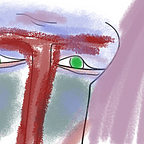A New Generation Is Conditioned to Agreeableness, Left Anxious Out of a Fear to Offend and Discriminate
Social media, P.C. culture, and respect for diversity create a forcefully agreeable generation, and just as anxious, alienated, and disconnected from their needs. In order for Generation Z to feel less alien, they must be brave enough to offend and disapprove.
Human culture is in a major turning point and a time of confusion in our behavior: How much do we censor ourselves to fit in our society? That’s always been an issue to a human being, we make laws, ethics, politics, and social norms to cope. But how much do we censor ourselves now in a society as diverse as ours? One that is interconnected through social media and that constantly pushes the lines of our privacy. And one that has a cancel culture that is just as real as the understandable sensitivity of group to group criticism. If we cannot be mean to an outgroup, we cannot be nicer to an ingroup. Right now, our culture pushes to reject a sense of ingroup, and it makes for a generation that’s anxious and disharmonized with their needs because they are alienated. Generation Z doesn’t feel like it belongs anywhere and to anything.
My argument is that diversity creates inequality and a taboo to discriminate, so people attempt to be nice to everyone and erase a sense of outgroup out of fear. Young people in urban cities all over the world feel alienated, and seek attention through unhealthy individualistic means because they are left abandoned and have no group they feel a part of.
In our current norms: We have to respect all groups, not make fun of a race, mental illness, sense of style, or behavior, because it is potentially oppressive (Or imperialist). We created a culture where respect is equal for every group and everyone, and we lost our place in the process. We are alienated. Individualistic. Sadly, we increasingly live in urban cities and create inescapable individualistic diversity, from Beirut in Lebanon to Kuala Lumpur in Malaysia to Tempe, Arizona, in the United States. Welcome to the culture of the 21st-century: Alienation out of respect for human feelings. A forced rejection of a sense of ingroup, and toxic attention-seeking individualism as a result of loneliness.
Agreeableness and being nice to everyone are counterproductive. You have to be mean to another to be nice to a group, you must reject an ideology, behavior, group, fashion sense, music genre, or political party: You have to belong to a community by rejecting another. The existence of something is only real if it contrasts with an opposite or an Other. However, we increasingly make a culture that wants us to be nice to everyone, to pretend that Humanity is our only in-group, but that only makes us sadder. There can’t be a group that doesn’t gossip or talk bad about another group that isn’t their own. Because isn’t opposition what makes your group real? Isn’t the only way to validate the existence of niceness and cooperation to have meanness and selfishness?
Oxytocin: Our Innate Ability to Love Is In Our Ability to Hate
Oxytocin is known to make rats more charitable, make parents give more attention to their kids, and make couples more trusting. The brain releases more oxytocin when the woman gives birth to increase empathy with her child. But oxytocin seems to live an evil double life.
“Oxytocin makes you more prosocial to people like you (i.e., your teammates) but spontaneously lousy to Others who are a threat.” — Robert Sapolsky, Behave, The Biology of Humans at Our Best and Worst, 2017
In a clever experiment by Carsten de Dreu, participants were asked to play a risk-based game where they should trust their partners to win but share rewards. The more oxytocin in the body, the more trust, and cooperation. But when people then played Prisoner’s Dilemma, they were more likely to get selfish wins and trick the other person to get them.
For a mother rat to love her pups, she must have a “don’t mess with my pups” attitude to threatening creatures and sharp objects. Love and care require an equal amount of anger and hostility.
In order for Generation Z to feel less alien, they must be brave enough to offend. They must be brave enough to disapprove, in order to belong.
